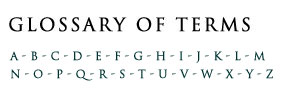
Glossary of Terms - V
Variable Annuity
A type of annuity that has a variety of investment options available for your selection. The rate of return you receive will depend on the performance of the investments you choose.
Variable Life Insurance
One of several types of life insurance policies that provide both life insurance protection and a savings component. The return on the savings portion of a variable life policy will generally vary, as it depends on the performance of the underlying securities.
Variable Universal Life Insurance
A form of permanent cash value life insurance that combines features of both variable life and universal life. As with universal life, you have flexibility with both premium payments and death benefit coverage. As with variable life, the rate of return on the cash value portion of the policy is not fixed, but rather depends on the performance of the underlying investments selected.
Venture Capital
Important source of financing for startup companies or others embarking on new or turnaround ventures that entail some investment risk but offer the potential for above average future profits. Venture is also referred to as risk capital.
Venture Capital Firm
A firm that exists to invest capital in startup companies or more mature companies that are undergoing expansion. In addition to capital, such a firm provides expert advice on management, marketing, planning, and other matters. Often, a venture capital firm is an independent business with no outside affiliations, or it may be an affiliate or subsidiary of a commercial bank, investment bank, insurance company, industrial company, or technology company.
Vesting
The right an employee gradually acquires by length of service at a company to receive employer-sponsored benefits, such as profit-sharing or a pension. After the vesting period elapses, entitlement to those benefits remains even if employment is subsequently terminated with the company.
Vested Interest
From a legal standpoint, a vested interest is an interest in something that is certain to occur as opposed to being contingent on an event that might not happen. Thus, a vested interest refers to a present fixed right of future use or enjoyment.
Vesting Schedule
The schedule according to which an employee of a company acquires the right to receive employer-sponsored benefits, such as payments from a pension fund, profit-sharing plan, or other qualified plan or trust, based on length of service with the company. Under the Tax Reform Act of 1986, employees must generally be vested 100% after five years of service or at 20% a year starting in the third year of service and becoming 100% vested after seven years.
Vision Care Insurance
Insurance that provides coverage for expenses relating to routine eye care (e.g., eye examinations, glasses, contact lenses).
Voting Stock
Shares in a corporation that entitle the shareholder to voting and proxy rights with regard to selection of directors and certain other corporate matters. Common stock typically carries voting rights, while preferred stock generally does not.